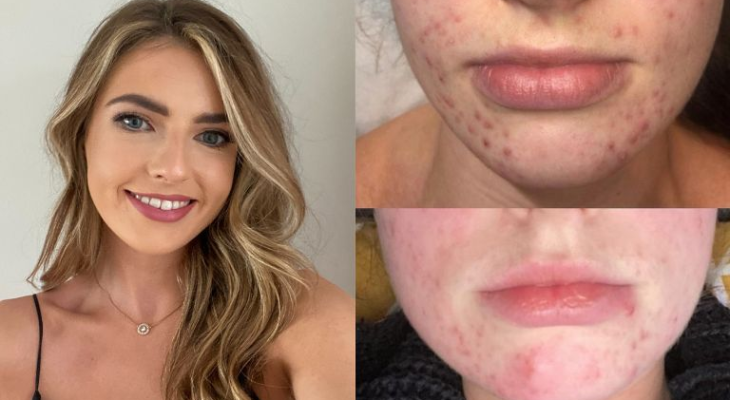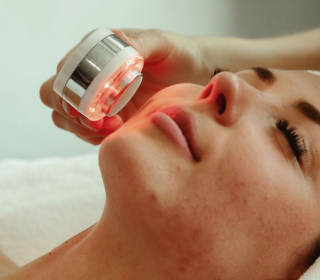Expert Reveals the Causes of Adult Acne and 7 Essential Skincare Tips

Do you have adult acne? Niamh Darcy, Re-Nu Clinic’s skin expert, reveals what causes acne flare-ups and seven important skincare tips that your skin will love.
Acne affects adults as well as teens.
Acne affects 95 percent of those aged between 11 and 30. Only 3 percent of adults over 35 years old are affected.
The main cause of adolescent pimples is the hormone surge that occurs during puberty.
Around 95 percent of those aged 11-30 are affected.
Similar to teenage acne, adult acne is also triggered by hormonal shifts, like pregnancy or menopause, when levels of oestrogen, progesterone, and testosterone drop. Adult acne is more common in women than in men.
“We are seeing more acne cases now than ever before,” says Niamh Dacy founder of Re-Nu Skin Clinic.
Changes in contraception or IVF can have a huge impact on your hormones and your skin.
“Hormonal-based conditions such as endometriosis or PCOS can impact your skin”

What causes adult acne?
Acne occurs when sebum, an oily substance which lubricates the skin and hair as well as dead skin cells, gets clogged up in our hair follicles.
Teen acne usually affects oilier skin and is more common in the T zone, chest and back. Adult acne is usually found around the mouth, chin or chin area. It is typically a dry acne.
Acne is a condition that can manifest in many ways. It can appear as tiny bumps or blackheads. Other forms of acne include pimples, cysts, and nodules, which occur when bacteria enters the deeper layers of the skin and causes inflammation.
Adult acne can be caused by many factors. Only 17 percent of your skin’s microbiome is inherited, so acne is most commonly caused by lifestyle choices such as chronic stress and dietary habits, skincare products, and medications.
Niamh explains that ‘what acne looks like can help you pinpoint the cause.
Acne is often caused by lifestyle choices such as chronic stress and dietary habits, skincare products, and medications.
Stress, diet and lifestyle are the main causes of yellow-headed spots, papules, and breakouts. However, hormonal acne can appear as painful purple or blue bumps.
Don’t worry about adult acne. It won’t go away. This will make it worse.
Acne can be a stubborn condition, so it is important to have patience when treating the skin.
Sometimes, your doctor will need to be consulted about your acne. It may be worth an appointment if you suspect stubborn acne that is infected with bacteria.
Here are some things you can try to treat and prevent acne in adults…
Visit a skin clinic
Niamh Carroll (26 years old) suffered from severe acne for 6 years.
Niamh was not sure what caused her adult acne. She tried all the different brands of skincare under the sun, costing her an arm and a leg.
When my acne was really bad, my skin would bleed and I could not wear makeup.
“I was mortified when my colleague asked me if I wanted a tissue because my face was swollen.
“The doctor told me I had acne and recommended I take prescription medication. But I didn’t wish to further affect my body.”
Niamh was suffering from purple and blue patches that were causing her much discomfort. She decided to visit Re-Nu Skin Clinic.
Niamh Darcy explains that at Re Nu Skin and Beauty Clinic, we use a combination medical-grade skincare products and salon treatments.
“For our in-salon treatment, we use Dermalux. This is a non-invasive treatment which uses light energy as a trigger to the skin’s natural repair and rejuvenation process.
This uses a combination red, blue, and near-infrared wavelengths that boost collagen, calm irritation and redness, and blast bacteria that cause blemishes.
Our AlumierMD home skincare line, which is backed up by science and medical research, helps to clear the skin using therapeutic doses.
We gave Niamh an AlumierMD skin care routine that focused on cleansing and protecting.
After three months, Niamh had no active acne.
I am much happier and more confident. Niamh Carroll reveals that she is no longer in pain and has no anxiety about the way her face looks.
AlumierMD’s products are only available after a consultation with a licensed professional. To learn more, please contact your local AlumierMD Clinic.
Take care of your gut
Watch out for any triggers that you may have in your diet. This could indicate a wheat or dairy intolerance. This can cause bloating, cramping and even skin breakouts.
Sugar and caffeine in excess can cause poor gut health. This may result in a disruption of the skin’s microbiome causing inflammation.

Find out what skincare products are available.
Even something as simple as using the wrong products on your skin, can cause an excessive production of oil.
Our skin cell turnover slows down as we age, resulting in a buildup of dead cells on our outermost skin layer. The correct products will help to restore the surface of the skin, resulting in a brighter and clearer complexion.
We recommend products that balance pH, control bacteria, and reduce sebum.
It will also help keep the skin balanced and moisturised.
We suggest products to balance pH, control bacteria and sebum.
Salicylic acid is a great ingredient to control oil production. It penetrates follicles and exfoliates dead skin cells to reduce acne.
Create a good skin care routine, preferably using a medical skincare brand such as Alumier MD. It is important to have a skincare regimen that addresses your current skin concerns.
Consistency is the key. Consistency is key. Cleanse your face both morning and night, and use the right products for your skin.
Check your medications

Unfortunately, some medications can cause breakouts in some people.
Niamh explains that these include medications to support mental health and thyroid underactivity.
Consult your doctor if you suspect that your acne may be caused by the medication you are taking. Your doctor can provide advice on supplements which will help to support your skin from the inside.
#5 Cleanse your makeup brushes
It is not necessary to wear makeup, but it is important that your brushes be cleaned before each use.
It is easy to use a makeup brush spray that has antibacterial properties. This can make a big difference on your skin.
Use an antibacterial soap to thoroughly clean your brushes every two weeks.
Deep clean your brushes every two weeks.
Double cleanse your face before going to bed. This will ensure that you have a clean, makeup-free skin. It’s important to thoroughly wash your face after exercising or going to the gym.
Changing your pillowcases more often will also help prevent the growth of bacteria.
#6 Do not touch your skin
Even though it may be tempting, avoid touching, picking or squeezing any acne on your skin. If you have to touch your face at all, make sure that your hands are clean before touching your skin.
Avoiding picking and squeezing the skin can also help prevent long-term acne scarring that may require treatment in future.
Add supplements to your daily routine
Addition of supplements to your daily diet can boost your results in terms of your skin.
You can take a variety of supplements to clear your skin. These include omegas, which help to regulate oil production, zinc and magnesium, both of which promote healthy sleep, and probiotics, which help to manage a healthy microbiome in the gut to promote clearer skin.
#8 Never forget your SPF
SPF is most important after a cleanser.
Niamh Darcy explains that it is important to protect the skin with an SPF high in antioxidants that will prevent inflammation of the skin that can lead to acne.
#9 Stress less
Burning the candle both ends, or chronic stress, can have a negative impact on your skin.
Niamh reveals that ‘women who never had acne before are now experiencing breakouts, and many people work longer hours and are therefore under increased stress’.










